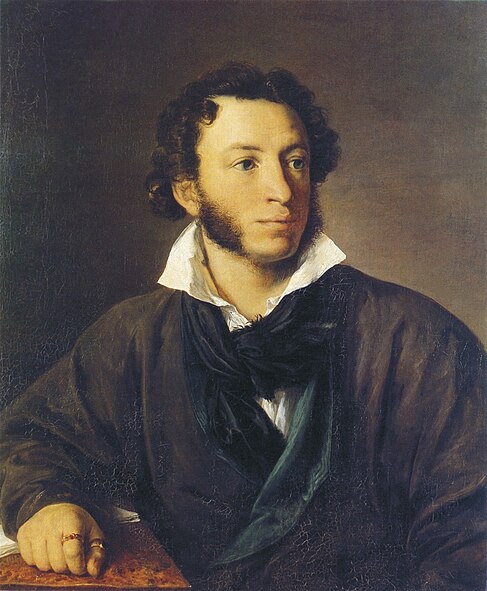Pushkin's father Sergei Lvovich Pushkin (1767–1848) descended from a distinguished family of the Russian nobility which traced its ancestry back to the 12th century. Pushkin's mother Nadezhda (Nadja) Ossipovna Gannibal (1775–1836) descended through her paternal grandmother from German, Scandinavian nobility, and a great-grandfather from central Africa, probably Cameroon. She was the daughter of Ossip Abramovich Gannibal (1744–1807) and his wife Maria Aleksejevna Pushkina (1745–1818). Ossip Abramovich Gannibal's father, i.e., Pushkin's great-grandfather, was Abram Petrovich Gannibal (1696–1781), a black page raised by Peter the Great who was born a prince of Lagon, an African tribal sultanate in present-day Cameroon. After education in France as a military engineer, Abram Gannibal became governor of Reval and eventually General-en-Chef for the building of sea forts and canals in Russia.
Born in Moscow, Pushkin published his first poem at the age of fifteen. By the time he finished as part of the first graduating class of the prestigious Imperial Lyceum in Tsarskoe Selo near Saint Petersburg, the Russian literary scene recognized his talent widely. After finishing school, Pushkin installed himself in the vibrant and raucous intellectual youth culture of the capital, Saint Petersburg. In 1820 he published his first long poem, Ruslan and Lyudmila, amidst much controversy about its subject and style.
Pushkin gradually became committed to social reform and emerged as a spokesman for literary radicals. This angered the government, and led to his transfer from the capital (1820). He went to the Caucasus and to the Crimea, then to Kamenka and Chisinau, where he became a Freemason. Here he joined the Filiki Eteria, a secret organization whose purpose was to overthrow the Ottoman rule over Greece and establish an independent Greek state. He was inspired by the Greek Revolution and when the war against the Ottoman Turks broke out he kept a diary with the events of the great national uprising. He stayed in Chisinau until 1823 and wrote there two Romantic poems which brought him wide acclaim, The Captive of the Caucasus and The Fountain of Bakhchisaray. In 1823 Pushkin moved to Odessa, where he again clashed with the government, which sent him into exile at his mother's rural estate in Mikhailovskoe (near Pskov) from 1824 to 1826.[14] However, some of the authorities allowed him to visit Tsar Nicholas I to petition for his release, which he obtained. But some of the insurgents in the Decembrist Uprising (1825) in Saint Petersburg had kept some of his early political poems amongst their papers, and soon Pushkin found himself under the strict control of government censors and unable to travel or publish at will. He had written what became his most famous play, the drama Boris Godunov, while at his mother's estate but could not gain permission to publish it until five years later. The drama's original, uncensored version would not receive a premiere until 2007.
Pushkin's wife Natalya Goncharova in the year 1831, during which Pushkin's growing lliterary influence was by then well known, he met one of Russia's other greatest early writers, Nikolai Gogol. After reading Gogol's 1831–2 volume of short stories Evenings on a Farm near Dikanka, Pushkin would support him critically and later in 1836 after starting his magazine, The Contemporary, would feature some of Gogol's most famous short stories. Later, Pushkin and his wife Natalya Goncharova, whom he married in 1831, became regulars of court society. When the Tsar gave Pushkin the lowest court title, the poet became enraged: he felt this occurred not only so that his wife, who had many admirers—including the Tsar himself—could properly attend court balls, but also to humiliate him. In 1837, falling into greater and greater debt amidst rumors that his wife had started conducting a scandalous affair, Pushkin challenged her alleged lover, his brother in-law Georges d'Anthès, to a duel which left both men injured, Pushkin mortally. He died two days later. His last home is a museum now.
The government feared a political demonstration at his funeral, which it moved to a smaller location and made open only to close relatives and friends. His body was spirited away secretly at midnight and buried on his mother's estate.

 Russia Dial Codes
Russia Dial Codes


 Ulyanovsk Time
Ulyanovsk Time


0 comentarios:
Publicar un comentario